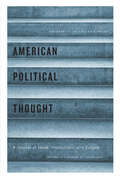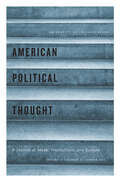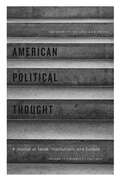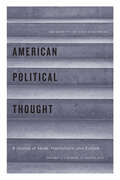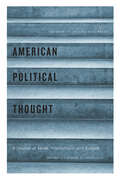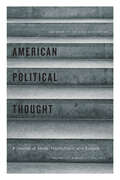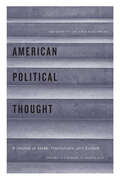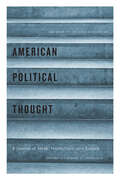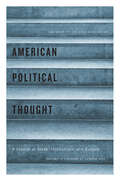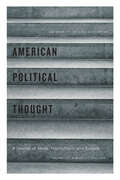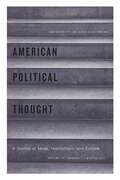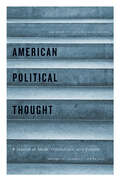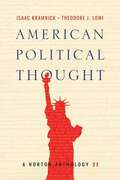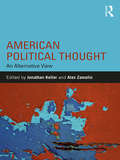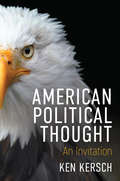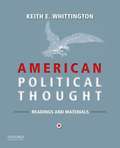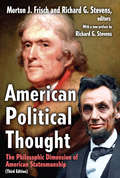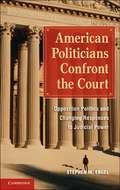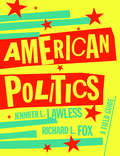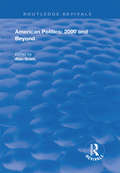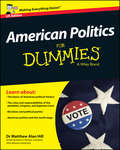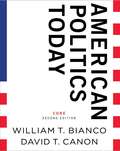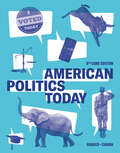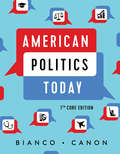- Table View
- List View
American Political Thought, volume 11 number 2 (Spring 2022)
by American Political ThoughtThis is volume 11 issue 2 of American Political Thought. Bridging the gap between historical, empirical, and theoretical research, American Political Thought (APT) is the only journal dedicated exclusively to the study of the American political tradition. Interdisciplinary in scope, APT features research by political scientists, historians, literary scholars, economists, and philosophers who study the foundation and political tradition of concepts such as democracy, constitutionalism, equality, liberty, citizenship, political identity, and the role of the state.
American Political Thought, volume 11 number 3 (Summer 2022)
by American Political ThoughtThis is volume 11 issue 3 of American Political Thought. Bridging the gap between historical, empirical, and theoretical research, American Political Thought (APT) is the only journal dedicated exclusively to the study of the American political tradition. Interdisciplinary in scope, APT features research by political scientists, historians, literary scholars, economists, and philosophers who study the foundation and political tradition of concepts such as democracy, constitutionalism, equality, liberty, citizenship, political identity, and the role of the state.
American Political Thought, volume 11 number 4 (Fall 2022)
by American Political ThoughtThis is volume 11 issue 4 of American Political Thought. Bridging the gap between historical, empirical, and theoretical research, American Political Thought (APT) is the only journal dedicated exclusively to the study of the American political tradition. Interdisciplinary in scope, APT features research by political scientists, historians, literary scholars, economists, and philosophers who study the foundation and political tradition of concepts such as democracy, constitutionalism, equality, liberty, citizenship, political identity, and the role of the state.
American Political Thought, volume 12 number 1 (Winter 2023)
by American Political ThoughtThis is volume 12 issue 1 of American Political Thought. Bridging the gap between historical, empirical, and theoretical research, American Political Thought (APT) is the only journal dedicated exclusively to the study of the American political tradition. Interdisciplinary in scope, APT features research by political scientists, historians, literary scholars, economists, and philosophers who study the foundation and political tradition of concepts such as democracy, constitutionalism, equality, liberty, citizenship, political identity, and the role of the state.
American Political Thought, volume 12 number 2 (Spring 2023)
by American Political ThoughtThis is volume 12 issue 2 of American Political Thought. Bridging the gap between historical, empirical, and theoretical research, American Political Thought (APT) is the only journal dedicated exclusively to the study of the American political tradition. Interdisciplinary in scope, APT features research by political scientists, historians, literary scholars, economists, and philosophers who study the foundation and political tradition of concepts such as democracy, constitutionalism, equality, liberty, citizenship, political identity, and the role of the state.
American Political Thought, volume 12 number 3 (Summer 2023)
by American Political ThoughtThis is volume 12 issue 3 of American Political Thought. Bridging the gap between historical, empirical, and theoretical research, American Political Thought (APT) is the only journal dedicated exclusively to the study of the American political tradition. Interdisciplinary in scope, APT features research by political scientists, historians, literary scholars, economists, and philosophers who study the foundation and political tradition of concepts such as democracy, constitutionalism, equality, liberty, citizenship, political identity, and the role of the state.
American Political Thought, volume 12 number 4 (Fall 2023)
by American Political ThoughtThis is volume 12 issue 4 of American Political Thought. Bridging the gap between historical, empirical, and theoretical research, American Political Thought (APT) is the only journal dedicated exclusively to the study of the American political tradition. Interdisciplinary in scope, APT features research by political scientists, historians, literary scholars, economists, and philosophers who study the foundation and political tradition of concepts such as democracy, constitutionalism, equality, liberty, citizenship, political identity, and the role of the state.
American Political Thought, volume 13 number 1 (Winter 2024)
by American Political ThoughtThis is volume 13 issue 1 of American Political Thought. Bridging the gap between historical, empirical, and theoretical research, American Political Thought (APT) is the only journal dedicated exclusively to the study of the American political tradition. Interdisciplinary in scope, APT features research by political scientists, historians, literary scholars, economists, and philosophers who study the foundation and political tradition of concepts such as democracy, constitutionalism, equality, liberty, citizenship, political identity, and the role of the state.
American Political Thought, volume 13 number 2 (Spring 2024)
by American Political ThoughtThis is volume 13 issue 2 of American Political Thought. Bridging the gap between historical, empirical, and theoretical research, American Political Thought (APT) is the only journal dedicated exclusively to the study of the American political tradition. Interdisciplinary in scope, APT features research by political scientists, historians, literary scholars, economists, and philosophers who study the foundation and political tradition of concepts such as democracy, constitutionalism, equality, liberty, citizenship, political identity, and the role of the state.
American Political Thought, volume 13 number 3 (Summer 2024)
by American Political ThoughtThis is volume 13 issue 3 of American Political Thought. Bridging the gap between historical, empirical, and theoretical research, American Political Thought (APT) is the only journal dedicated exclusively to the study of the American political tradition. Interdisciplinary in scope, APT features research by political scientists, historians, literary scholars, economists, and philosophers who study the foundation and political tradition of concepts such as democracy, constitutionalism, equality, liberty, citizenship, political identity, and the role of the state.
American Political Thought, volume 13 number 4 (Fall 2024)
by American Political ThoughtThis is volume 13 issue 4 of American Political Thought. Bridging the gap between historical, empirical, and theoretical research, American Political Thought (APT) is the only journal dedicated exclusively to the study of the American political tradition. Interdisciplinary in scope, APT features research by political scientists, historians, literary scholars, economists, and philosophers who study the foundation and political tradition of concepts such as democracy, constitutionalism, equality, liberty, citizenship, political identity, and the role of the state.
American Political Thought, volume 14 number 1 (Winter 2025)
by American Political ThoughtThis is volume 14 issue 1 of American Political Thought. Bridging the gap between historical, empirical, and theoretical research, American Political Thought (APT) is the only journal dedicated exclusively to the study of the American political tradition. Interdisciplinary in scope, APT features research by political scientists, historians, literary scholars, economists, and philosophers who study the foundation and political tradition of concepts such as democracy, constitutionalism, equality, liberty, citizenship, political identity, and the role of the state.
American Political Thought, volume 14 number 2 (Spring 2025)
by American Political ThoughtThis is volume 14 issue 2 of American Political Thought. Bridging the gap between historical, empirical, and theoretical research, American Political Thought (APT) is the only journal dedicated exclusively to the study of the American political tradition. Interdisciplinary in scope, APT features research by political scientists, historians, literary scholars, economists, and philosophers who study the foundation and political tradition of concepts such as democracy, constitutionalism, equality, liberty, citizenship, political identity, and the role of the state.
American Political Thought: A Norton Anthology
by Isaac Kramnick Theodore J. LowiThe leading anthology, now more relevant than ever Revised and updated based on instructor feedback, this Second Edition presents key works from the colonial period to the present era. New selections―including readings from the Obama and Trump eras―help students understand how political thought in the 21st century builds on and sometimes departs from earlier traditions.
American Political Thought: An Alternative View
by Alex Zamalin Jonathan KellerThe twenty-first century presents unique political challenges, like increasing concern over racially based police brutality and mass incarceration, continuing economic and gender inequality, the rise of conservative and libertarian politics, and the appropriate role of religion in American politics. Current scholarship in American political thought research neither adequately responds to the contemporary moment in American politics nor fully captures the depth and scope of this rich tradition. This collection of essays offers an innovative expansion of the American political tradition. By exposing the major ideas and thinkers of the four major yet still underappreciated alternative traditions of American political thought—African American, feminist, radical and conservative—this book challenges the boundaries of American political thinking about such values like freedom, justice, equality, democracy, economy, rights, identity, and the role of the state in American life. These traditions, the various authors show in different ways, not only present a much fuller and more accurate characterization of what counts as American political thought. They are also especially unique for the conceptual resources they provide for addressing contemporary developments in American politics. Offering an original and substantive interpretation of thinkers and movements, American Political Thought will help students understand how to put American political thought into conversation with contemporary debates in political theory.
American Political Thought: An Invitation
by Ken KerschHow do Americans think about foundational political questions? Covering the full span of U.S. history, American Political Thought: An Invitation offers a lively yet sophisticated overview of the nature and dynamics of American Political Thought for students and general readers alike. Award-winning scholar Ken Kersch’s engaging introduction situates the key debates in their historical, political and cultural context. He introduces the touchstone frameworks and ideas that are both deeply ingrained and yet have been actively re-made in a country that has spent 250 years of shifting circumstances battling over their real-world implications. Covering thinkers ranging from Jefferson to Rawls, Du Bois to Audre Lorde, he examines the ambiguities of the purportedly ‘consensus’ American principles of liberty, equality, and democracy as well as addressing questions ranging from ‘What are the foundations of a legitimate political order?’ and ‘What is the appropriate role of government?’ to ‘What are the appropriate terms of full civic membership ?’ - and beyond. Politically balanced and inclusive, American Political Thought introduces the contested terrain concerning these core political questions as they were raised over the course of the USA’s often dramatic history.
American Political Thought: Readings and Materials
by Keith E. WhittingtonAmerican Political Thought: Readings and Materials presents a diverse collection of writings, speeches, judicial opinions, and other political documents, offering an introduction to the controversies and disputes that have mobilized Americans since the first settlements in North America. Ranging from the Colonial era to the present day and featuring both traditional readings and lesser known documents this reader takes a historical approach that helps students see how political, economic, and social conditions led to the development of specific political ideas. Each chapter includes a substantial introduction and each reading is enriched by headnotes and discussion questions.
American Political Thought: The Philosophic Dimension of American Statesmanship
by Richard G. Stevens Morton J. FrischThis book focuses on the political thought of American statesmen. These statesmen have had consistent and comprehensive views of the good of the country and their actions have been informed by those views. The editors argue that political life in America has been punctuated by three great crises in its history the crisis of the Founding, the crisis of the House Divided, and the crisis of the Great Depression.The Second World War was a crisis not just for America but for the whole of Western Civilization and, in the wake of that war, a new crisis arose which came to be called the "Cold War." Just when that gave the appearance of being resolved, the world reached a new juncture, a new crisis, which Samuel P. Huntington dubbed the "clash of civilizations." The statesmen having political responsibility in confronting the first three crises in America's history came as close to philosophic grasp of the problems of liberal democracy as one could demand from those embroiled in the active resolution of events. Their reflection of political philosophy in the full sense informed their actions.Since we cannot confidently explain the future, Aristotle warned us to call no man happy while he still lives. Thus the book, in its third edition, keeps to its settled pattern of dealing with settled matters. The preface to the third edition confronts the three later crises and, to the extent consistent with truth, attempts to relate them to the first three.
American Politicians Confront the Court
by Stephen M. EngelPoliticians have long questioned, or even been openly hostile to, the legitimacy of judicial authority, but that authority seems to have become more secure over time. What explains the recurrence of hostilities and yet the security of judicial power? Addressing this question anew, Stephen Engel points to the gradual acceptance of dissenting views of the Constitution, that is, the legitimacy and loyalty of stable opposition. Politicians' changing perception of the threat posed by opposition influenced how manipulations of judicial authority took shape. As politicians' views toward opposition changed over time, their approach toward the judiciary - where opposition could become entrenched - changed as well. Once opposition was no longer seen as a fundamental threat to the Constitution's survival, and multiple constitutional interpretations were considered legitimate, judicial power could be construed less as the seat of an illegitimate opposition and more as an instrument to achieve political ends. Politicians were more likely to harness it to serve their aims than to openly undermine its legitimacy. In short, conflicts between the elected branches and the judiciary have not subsided. They have changed form. They have shifted from measures that undermine judicial legitimacy to measures that harness judicial power for political ends. Engel's book brings our understanding of these manipulations into line with other developments, such as the establishment of political parties, the acceptance of loyal opposition, the development of different modes of constitutional interpretation, and the emergence of rights-based pluralism.
American Politics (First Edition): A Field Guide
by Jennifer L. Lawless Richard L. FoxA groundbreaking new approach builds skills for critical thinking and effective citizen engagement. Years of teaching and participating in politics have shown Jennifer Lawless and Richard Fox that students learn more if they’re engaged by what they’re learning, and they can put what they’re learning into practice by understanding how to participate. These principles come together in American Politics: A Field Guide. This unique text captivates students with provocative questions while helping to build the skills necessary for effective citizen engagement and political participation. This purchase offers access to the digital ebook only.
American Politics - 2000 and beyond: 2000 And Beyond (Routledge Revivals Ser.)
by Alan GrantThis title was first published in 2000: An examination of some of the key themes and issues central to the understanding of the contemporary political scene in the USA at the beginning of the 21st century. Bringing together the work of a number of academics with expertise in the field, it focuses on the state of American democracy and the working of the nation's governmental and political institutions. The topics covered include: American society and the politics of "Balkanisation"; party politics in Congress since the Republican takeover of control; presidential power and the experience of the Clinton presidency; the making of foreign policy; the office of independent counsel after the Starr report; the Rehnquist Supreme Court in a post-civil rights era; the influence of the Christian right; the Republican Party policy agenda; campaign finance reform; elections, voting behaviour and campaigning; and the reshaping of the federal system.
American Politics For Dummies - UK
by Matthew Alan HillThe simplest way to get to grips with the American political system American Politics For Dummies is an engaging and accessible guide to the inner workings of the U.S. government, cutting through the political jargon, to give you the facts. The book begins with the basics, including government structure and processes, and later covers current events that make the news. The world of American politics can be bewildering to anyone not born and bred in the U.S.A. This plain-English guide is perfect whether you are a student or simply fascinated by the world's most powerful democracy. From the electoral process to 'special relationships', you discover all you need to know with American Politics For Dummies. • The birth of America – find out about the emergence of the US,from the ideas upon which America was founded to the creation of the US Constitution • Go government – understand the powers of the President, how Congress operates, the function of the Supreme Court and how US laws are created and passed • Party on – discover the ins and outs of elections and political parties, from the electoral process and the two-party system to the voting behaviour amongst Americans • One nation, many identities – get to understand the workings of a truly multicultural society • All the world’s a stage – grasp the grand strategy of the US to understand why the nation acts as it does in international politics 2014 kicks off the latest round of U.S. Congressional election and marks the beginning the 2016 Presidential election cycle. There will be headlines, there will be debate and there will be news. If you're looking to keep up and understand it all, American Politics For Dummies is a great place to start.
American Politics Today
by David T. Canon William T. BiancoAre your students cynical about conflict in American politics? Do they believe politicians generally fight for the sake of fighting, or to gain short-term advantage? Do they believe policy makers should simply set aside their differences and "listen to what the people want"? Bianco and Canon show students that conflict--and the compromise that is necessary to resolve it--is a normal, healthy part of the process that makes American democracy work.
American Politics Today (Core Eighth Edition)
by David T. Canon William T. BiancoA student success approach to American government The concepts of democracy, liberty, and equality are central to understanding how American politics works. But not all citizens experience the same opportunities for equality in these areas. The playing field is not even. The Eighth Edition of?American Politics Today features a collaboration with two experts in teaching and learning, Cassandra Khatri (Lone Star College, University Park) and Cory Colby (Lone Star College, Tomball) to bring best-practices for engaging all students in the discussion of American government. By enhancing the proven nut and bolts focus of the explanations with new pedagogy they help students draw connections between their reading assignments, their lived experiences, and American government. With a new, supportive and motivational ebook experience, and robust online resources, instructors have the flexibility to build a course pathway keyed to the unique needs of their students, creating a more equal opportunity for all to succeed. This purchase offers access to the digital ebook only.
American Politics Today (Core Seventh Edition)
by David T. Canon William T. BiancoPolitical knowledge matters Informed citizens need to distinguish fact from opinion, truth from fiction, and news from noise. This edition of American Politics Today provides students with even more tools they can use to cut through the clamor and understand how politics really works, including an infographic in the text that introduces best practices for evaluating political reports in the media. By breaking down the basics of American government into easily understood processes and procedures, and by teaching students how to assess sources of political information, students gain the knowledge and skills necessary to unpack the headlines and make sense of American politics now and in the future. This purchase offers access to the digital ebook only.
